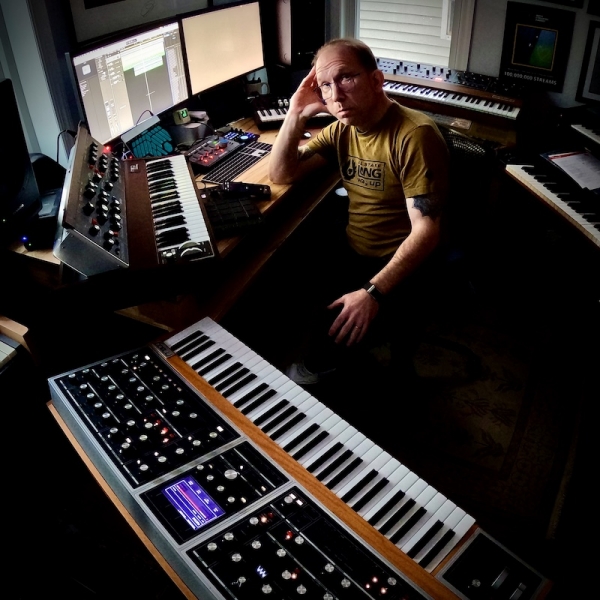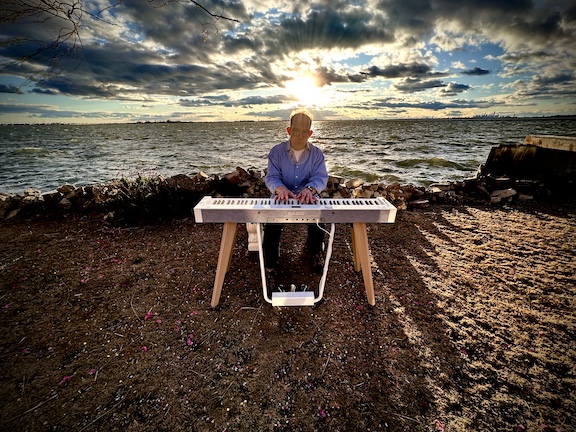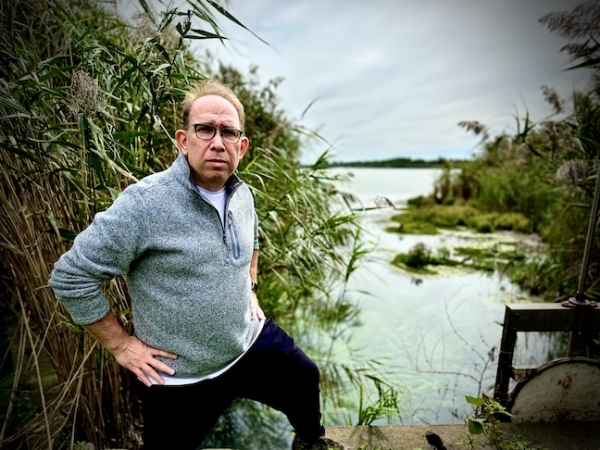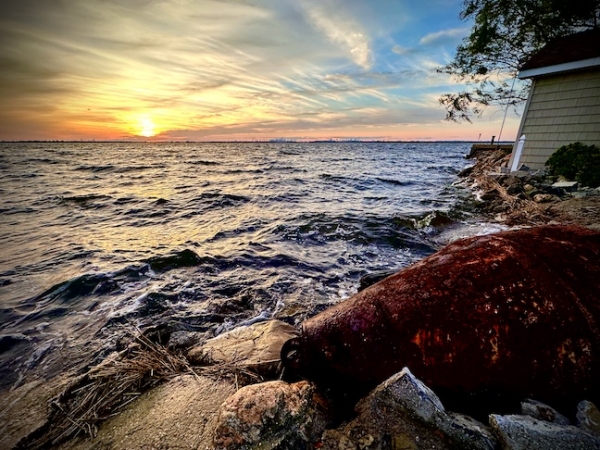Michael Whalen is one of the busiest artists around! He is getting ready to release his second album of 2024,
Watercolor Sky, which I love! The album drops on May 24, 2024, and Michael refers to it as his best work yet. Michael often plays a wide range of instruments on his albums, but this one is a collaboration with five of the best musicians on the planet and the goal was to create an album in the "Windham Hill style and sound." In this interview, Michael and I talk about the album in depth as well as how his move to his home on the water has affected his music.
KP: Hi Michael! How are things on the water in New York City? Did you know there is more coast line in NYC than any city in the country?
MW: (Laughs) Yes! I did! I live on Jamaica Bay in Queens. The waterfront in the city is amazing because people don’t associate the water with New York (I am not sure why). But the coastline and the beaches are so beautiful - especially with the Summer coming up!
KP: We're right on the coast (in Oregon), and although we aren't close enough to see the ocean or river, we can hear it. There is something very life-affirming about that!
Your second album for 2024,
Watercolor Sky, will be released in a few weeks. You have said that it is one of the most important albums of your career of more than 30 years. Tell us about it and why it is so important.
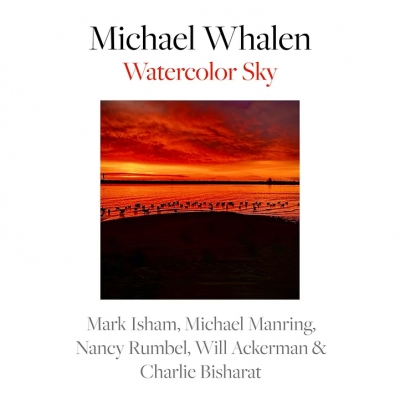
Click on album cover to
go to Kathy's review.
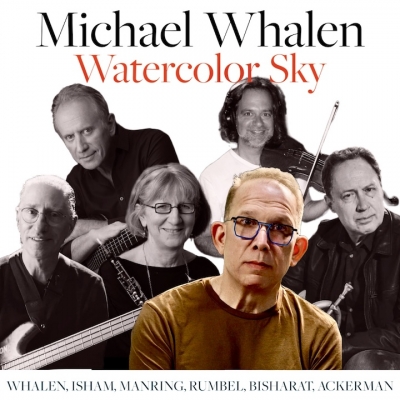
Front row: Michael Whalen. Second row: Michael Manring, Nancy Rumbel, Mark Isham. Back row: Will Ackerman and Charlie Bisharat.
MW: I have done some good projects but this one is my “best” because I had a clear intention of capturing that musical sound and “vibe” of the Windham Hill Records on the 1980s and I think I did that. Having Will Ackerman (founder of Windham Hill) helped when I wanted to make sure I was on track! (Laughs) Seriously, Windham Hill Records were and are so important to me as an influence and a musical touchstone that going and doing this project was inevitable for me as far as I am concerned. Windham Hill represents a standard, integrity and commitment to making great music that has always been a goal of mine on every album I have done. In doing this album, I was clear on my goal and I achieved what I set out to do.
KP: The other five musicians on the album are some of the best and best-known musicians in the so-called "new age" genre. All five are also Grammy winners. The personnel on the album are you on piano, electronics and percussion as well as composing all nine of the tracks, arranging, producing and mixing; Mark Isham on trumpet and flugelhorn, Michael Manring on bass, Nancy Rumbel on English horn and oboe, Will Ackerman on guitar and Charlie Bisharat on violin. How did you choose the musicians for the album?
MW: Each of the musicians on the project are friends, but their music has also been a big influence on my own music. Also, Quincy Jones said: “A good producer calls a great player and lets them do what they do.” So, I wasn’t going to call another trumpet player and say: “play like Mark Isham.” I am going to call Mark and tell him to be himself! (Laughs) Honestly, I think that is one of the biggest mistakes producers make: they call players and try to shape their performances to their vision of the track rather than letting the musician shape the music. So, I knew that each of these players was great and I let them do what was authentic and true for them musically. I also wrote the music with each of these players in mind. That makes a big difference, too. You want the best from every player you call - - so, give them every opportunity to be great and more times than not - - they are!
KP: Were each of the instruments recorded separately or did you have some live sessions with the other musicians?
MW: Because of schedules and logistics, yes, each of the parts was recorded separately. Everyone is so good that they jumped into the arrangements and made it sound like the six of us were in a studio together. Wonderful! Technology is such now that everyone records at home and it makes it possible to be able to afford the players. If I had to book a studio on top of the players - - I wouldn’t be able to afford them.
KP: What inspired the music on the album?
MW: I mentioned the music of Windham Hill - - but one particular album really inspired me:
Unusual Weather by Michael Manring which was released by Windham Hill in 1986. If you don’t know it, it is a gorgeous recording. I loved Michael’s approach to melody writing and that while it is a beautiful album it isn’t “sleepy.” There’s a pulse and an energy to the music. So,
Watercolor Sky started with that template and I created this music using my own musical vocabulary. Michael recorded his bass parts FIRST before any other player was done because I wanted to give him the freedom to play the melodies and counter lines without worrying about stepping on anyone’s parts except my piano! (Laughs)
KP: You have said that living on the water as opposed to in the city has had a very big effect on your music. Can you explain that a bit?
MW: Living on the water has fundamentally changed my life. I am not using hyperbole or overstating it. I look at the water all day. Nature demands that you pay attention to it. All day long the water changes, birds come and go, the sky changes and 10,000 other minute things happen that people who live in the city NEVER see or experience. Living on the water makes you think about time differently as well. This has had a huge effect on my music because I don’t want to waste a moment because that moment will not come back again. Most people think that life is a series of repeating loops. Not true. Life is a single straight line filled with experiences (if you want them) that take you to your last day. In this world, being creative and expressive is so important. Nature makes you take NOTHING for granted. So, this album is my way of “thanking” Nature and the world for the beauty it affords me everyday. I am just paying the beauty forward…
KP: That's a really inspiring way to look at it!
Other than the actual recording, how did you collaborate with the artists?
MW: Will, Mark, Michael, Nancy and Charlie have been so helpful with ideas. That’s the wonderful part of collaboration - you work with people who aren’t just machines - they are generous and thoughtful about what is needed and most importantly - what is NOT needed. Having so many experienced pairs of ears around is wonderful. Also, they are all composers so they can jump into the intention of the music so easily - it is wonderful.
KP: You mentioned that this album is more optimistic than some of your other music. How so?
MW: I think that some people have an idea that “new age” music is all moody, reflective and meditative. The music on this album is optimistic and is generally bright with a pulse. You can certainly use it for a daily yoga practice but I think most people will want to take a walk, hike or a run to this project. It wants to open up vistas for the listener. It is also great music to DRIVE to! I have taken several long trips listening to this music.
KP: Let's talk about some of the individual pieces. What inspired "The Road Not Taken"? It's interesting the way most of the parts are very open and spacious, but the percussive rhythm is quite lively.
MW: This song is deeply influenced by another Windham Hill album - Vapor Drawings by Mark Isham from 1983. It might be my favorite Windham Hill album EVER. More than the other music, this song has me plugging-in some of those Isham-esq textures. Having Mark actually play on the song was just too much for me. He really liked the track. I thought having the texture shift to a little more electronic on the album was a nice contrast.
KP: I agree! "Dancing In the Wind" is so light-hearted and playful and has an almost Celtic feeling to it. What inspired it?
MW: Here on the water, the seagulls will glide on the wind for many minutes at a time with a stiff wind coming onto shore. It is really remarkable to see DOZENS of birds held in the wind moving slightly to catch the breezes. Musically, the song is my “riffing” on a classical type melodic form. I really had a great time with it. So did Charlie and Michael!
KP: The title "The Flood At High Tide" seems like it might express a sense of panic, but instead it is very calm and unhurried - peaceful even. Why is that? Is flooding that common where you live that it doesn't cause panic?
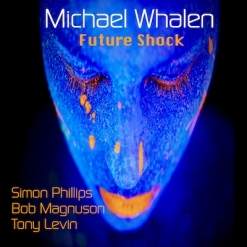
Click on album covers
to go to Kathy's reviews.
MW: When you live on the water, a “flood” could be a daily occurrence depending on the location of the Moon, the weather generally and timing of high tide. So, “panic” is not something you do in the face of floods. You manage it like taking care of your lawn, a pet or anything else around your house. Again, Nature demands to be noticed on the water, therefore, tides are simply part of the daily life of the bay. When we first moved in - yes, the flooding made me think we were in a Hollywood disaster movie. Now, we manage the six things that need to happen to protect the house and our stuff and it’s all fine. I wanted the music to reflect this somewhat blase attitude we have developed. (Laughs)
KP: I was really intrigued to learn that about 80% of your area is a wildlife refuge. How close are you to that and what kinds of wildlife are there?
MW: The refuge is about a mile from us but the animals don’t know that! The birds and foxes and other critters are everywhere. Given that we are in New York, most of the protected animals are birds who don’t want to go into midtown - tens of thousands of them. The Spring and Fall are miraculous when you see the migrations pass through our island. Incredible.
KP: You have been a Casio Artist for over two years. In that time, you have released four albums which feature piano sounds that were played on a Casio digital piano and NOT an acoustic piano. Tell us a bit about the Casio.
MW: Yes, I have used the Casio PX-S7000 digital piano on my last four releases. It is a remarkable instrument with a great keyboard feel and sound. I like the sound of the Casio enough to dissuade me from going to Vermont and recording on Will Ackerman’s Steinway grand piano like I did back in 2019 for my album Cupid Blindfolded. Also, recording on my Casio makes the process of creating the music and performing it seamless. I have my Casio in my living room and that is where all of my ideas begin to coalesce. Immediately, I can start recording piano tracks and the creative process powers the production process. It is inspiring because you’re not wasting a lot of time with technology. If you are looking for a GREAT feeling and sounding piano, I highly recommend the Casio.
KP: I know you've said you don't own a piano (except your Casio digital piano), but about how many keyboards do you have? (I know this can become an obsession for guitarists - is it the same for keyboard players??)
MW: If you include the Casio keyboards, I own about 30 now. Before you faint, I would suggest listening to an album like Imaginary Trains (2022) or Sacred Spaces (2020) or even Future Shock (2021) to hear how I have used all of those instruments on large scale electronic projects. I love sound design and painting on HUGE musical canvases - however, Watercolor Sky has very few keyboard tracks and has been MORE satisfying for me because of the opportunity to work with so many great musicians.
KP: You released FOUR albums in 2023. Are you planning the same for 2024? If so, what's after Watercolor Sky?
MW: Yes. I have two “older” projects which have waited to come out: the soundtrack album for the film Veronica Decides to Die and an electronic art installation piece I did back in 2005. I will release these in the Fall. I am recording two duo projects which I am not quite ready to talk about yet - - very different but very cool. You will hear them in 2025.
KP: Do you usually work on several projects at a time?
MW: Yes, I am starting a project, in the middle of a project and mixing a project all simultaneously almost continuously. My brain is such where I need to keep it occupied lest I get into real trouble! (Laughs)
KP: Aha! Great motivation! With recordings, Artist Expansion, soundtracks and advertising music, how do you keep everything straight? I'm so impressed - especially when everything you do is of such high quality!
MW: I think the only way to do anything is 100%. From cooking, to making love, to making music or giving the dog a bath - - you do things 100% or don’t do them at all. I think creating work that is always high quality is the mark of a complete artist - it is the hallmark of them as a creative person and a person of integrity. Too many people simply pump out dreadful music because technology has made the creation of dreadful music pretty easy. I cannot do that. I want people to associate my name with music that is made with care and craftsmanship. We live in an age where hand-hewn work is appreciated. I make music for people who know and can hear the difference.
KP: Excellent! One more question: What is your favorite quote about music by a musician?
MW: "If you don't live it - it won't come out your horn…” - Charlie Parker
KP: I love it! Thanks so much, Michael!
For more information about Michael Whalen and his many projects, be sure to visit
his website and his
Artist Page here on MainlyPiano.com.
Kathy Parsons
May 2024

